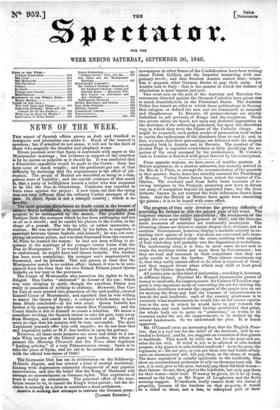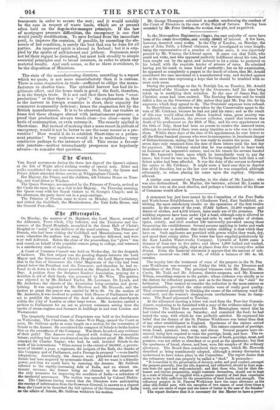The progress of time only develops the growing difficulty of
providing for Ireland in this the second year of her want. The exigency outruns the earlier calculations ; the weaknesses of the people are even more fatally apparent on trial ; and the Govern• ment measures of assistance are confessedly inadequate. The labouring classes are driven to supine despair or to violence, not to exertion. Government, however, display a laudable activity in ex- tending their sphere of help : war-ships are converted into store- ships, and are distributed about the coast, soothing with supplies of food while they will probably awe the disposition to turbulence. The landowning class, it is true, in most cases do not seek to evade the auxiliary duties put upon them by Government ; but they are loud and incessant in their complaints that they are quite unable to bear the burden. Their almost unanimous cry is, that they really cannot afford to do what is expected of them ; and they suggest divers plans which may shift at least great part of the burden upon others. All parties join in this kind of declaration ; couching it, however, in different forms. Practical Mr. Mansell recommends grants of
money to landlords, for improvements. Sir Colman O'Loghlen sug-
gests a very ingenious mode of converting the act for making the landlords contribute towards the support of the people into an act for making the State pay half the expense of improvements to benefit the said landlords: each of the country gentlemen is to ascertain what improvements he would like on his estates equiva- lent to the sum to which he would have to pay towards the
labour-rate, and each individual having ascertained that point, the whole body are to agree in " presenting," as works to be
executed under the act, the improvements to be desired by the several landowners. So we understand the plan. It is much approved. Mr. O'Connell owns an increasing fear, that the English Poor- law, that is a real law for the relief of the destitute, will be ex- tended to Ireland ; and he, too, suggests an extension of free grants to landlords. That would be truly one law for the poor and an- other for the rich. If relief is not to be allowed to able-bodied paupers, why grant it to able-bodied landlords Z As to the poor, the
argument is—Do not give, or you get them into bad habits of reli- ance on eleemosynary aid ; but pay them, in the shape of wages. The same argument is equally applicable to the landlords, who show an extraordinary proneness to rely on eleemosynary aid. Do not, it is said, give to the poor, but only pay them for their wares—
their labour : do not, then, give to the landlords, but only pay them for their wares—their land. If money be given, let it be by loan, secured on the land, as Mr. Naper of Lougbcrew and the Kells
meeting suggest. If landlords really cannot fulfil the duties of property, because of the burdens on that property, it would be a relief to them, not a loss, to relinquish part of their
tenements in order to secure the rest ; and it would notably be the case in respect of waste lands, which are atpresent often held on the dotp-in-th - principle. If the law
of mortgages presents difficulties, emergency; is one that
would justify modification. To save Ireland from the immediate peril, to improve the occasion, if possible, by amending the ele- ments of her condition, is surey the best that can be done for all parties. An improved spirit is abroad in Ireland ; but it is crip- pled by the spirits of self-interest and jobbery. Statesmen must not let their regard be distracted, but must look steadily to simple essential principles and to broad interests, in order to attain any material results. And such seems, so far as there is evidence, to be the disposition of Ministers.



























 Previous page
Previous page